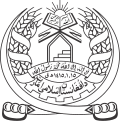This article needs to be updated.(February 2022) |
 |
|---|
Capital punishment refers to the execution of an offender sentenced to death after conviction of a criminal offense. [1] Capital punishment is legal in Afghanistan and can be carried out secretly or publicly due to the current governmental system. [2] [3] The main methods of execution employed by the Afghan government on convicts are hangings and shootings. [4] Stoning, amputation, and flogging are also sometimes used as a method for punishment and were especially prominent during the late 1990s. [4] Public executions have existed throughout Afghanistan's history. The former Afghan government took important steps away from the use of the death penalty, but they have continued with the Taliban returning to power in August 2021. [4] [5] Some executions have been recently condemned by the United Nations. UN experts have called on Afghan authorities "to halt immediately all forms of torturous, cruel, and degrading forms of punishments." [6] The capital offenses in Afghanistan include a range of crimes from murder to adultery, and are governed by Islamic Sharia law, along with civil laws. [5]